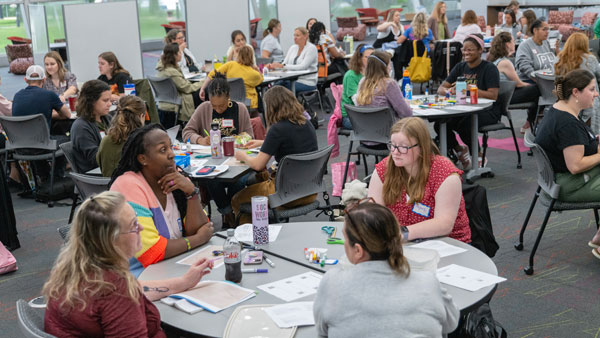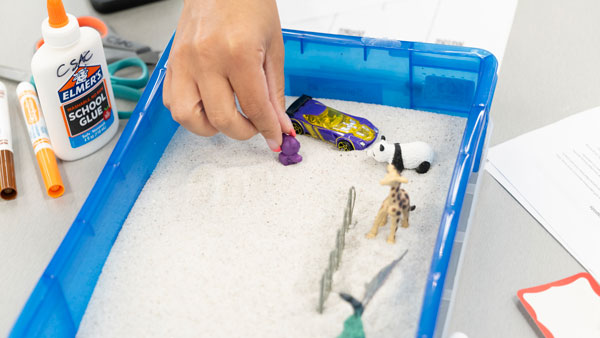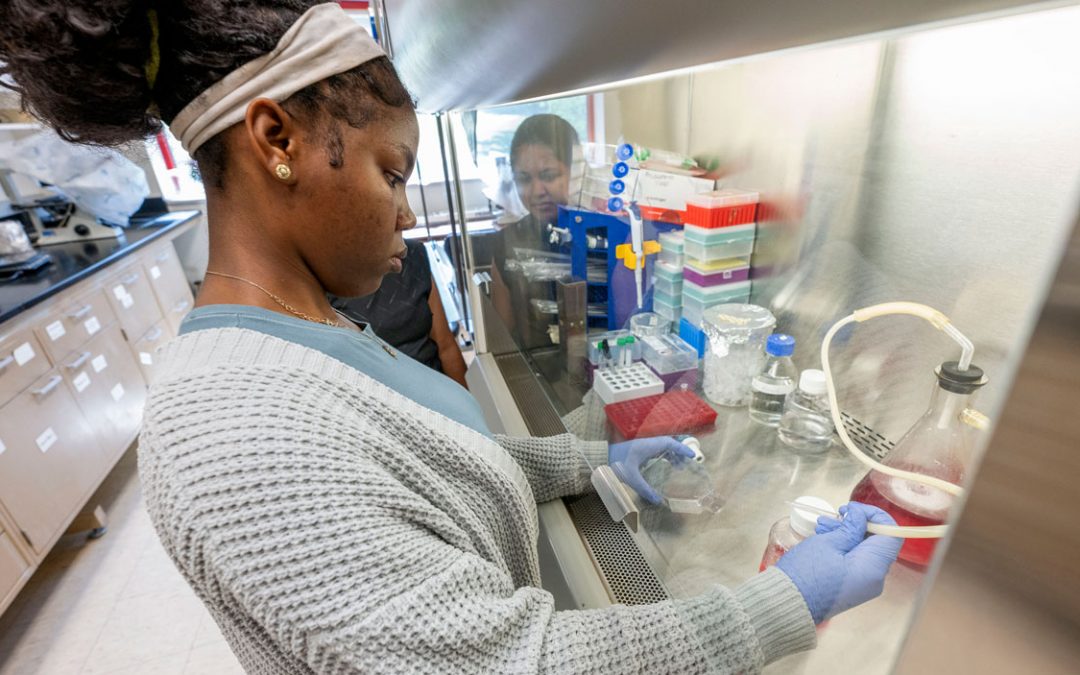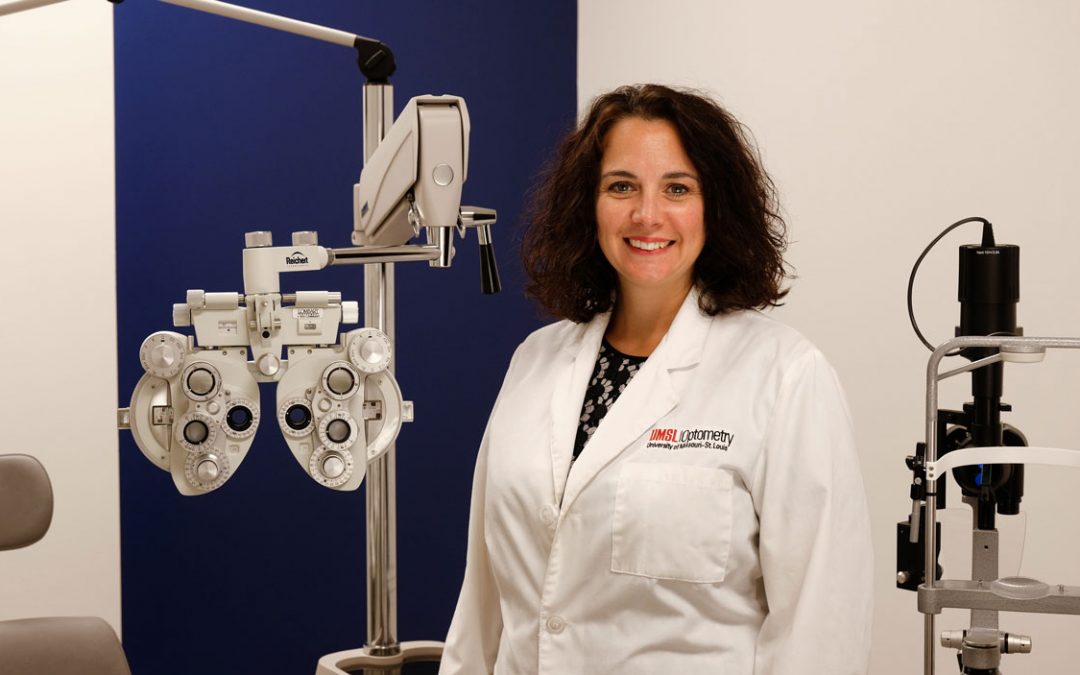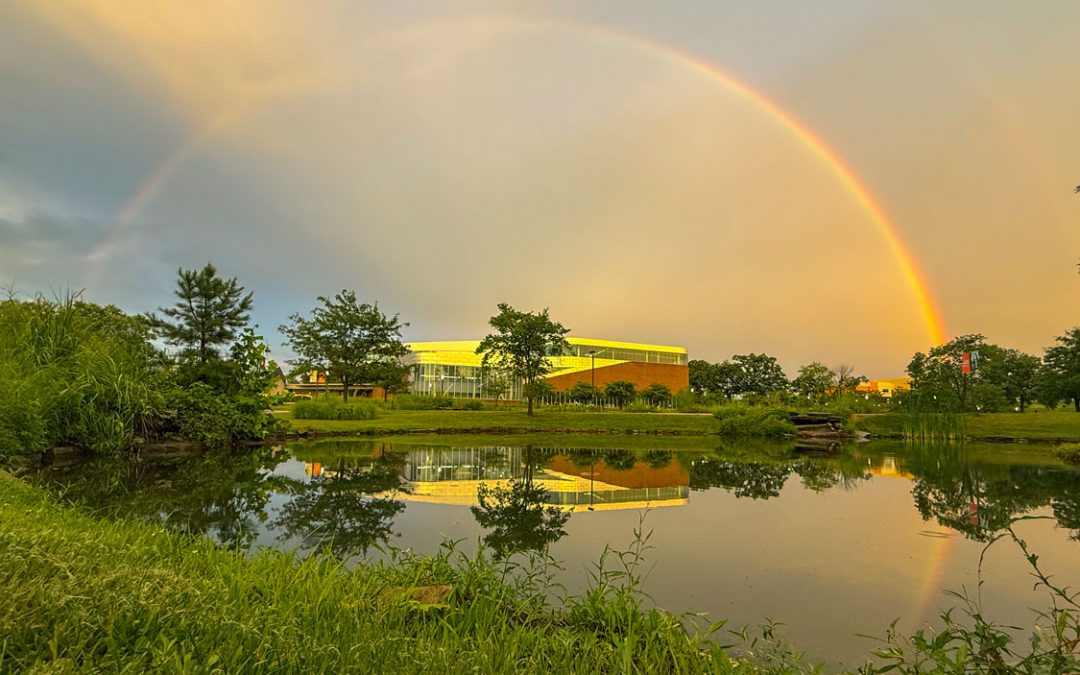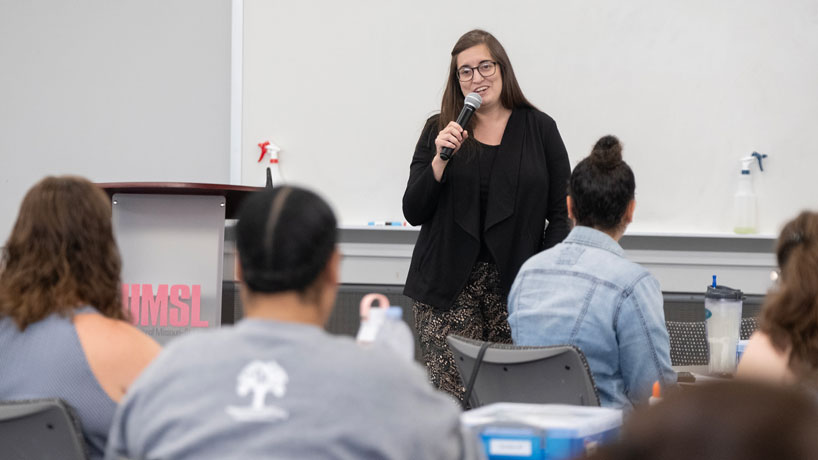
Emily Brown, associate professor of counseling at UMSL and the director of the Play Therapy Institute, speaks to attendees during the Counseling and Social Advocacy Center’s fourth annual Play Therapy Conference in July. The two-day conference provided up to 12 hours of NBCC and APT approved continuing education in play therapy. (Photos by Derik Holtmann)
Talk therapy is a common tool in counseling, but Emily Brown, associate professor of counseling in the College of Education at the University of Missouri–St. Louis, says more and more mental health professionals are recognizing that it can be a less effective approach with children.
“If you’ve tried to get a 3-year-old to talk to you for 50 minutes, it’s difficult,” she said.
So, how do you reach children, particularly those dealing with trauma or emotional regulation issues?
Well, you let them play. The approach is known as play therapy, an evidence-based practice using therapeutic play to help children develop self-esteem, self-control and emotional regulation.
“In thinking about play therapy, it’s coming out of the developmental lens that play is how children communicate,” Brown said. “Toys become their words. It is a way that children are able to process their experiences, express their needs and convey emotion, and a trained play therapist is able to recognize children’s symbolic play in ways that are going to allow for connection with the therapist.”
UMSL has been a leader in the area of play therapy since the founding of the Play Therapy Institute, housed in the Counseling and Social Advocacy Center, in 2015. Brown, who is also the interim chair of the Department of Education Sciences and Professional Programs, leads the institute and has nearly 20 years of experience studying, practicing and researching play therapy.
Now, thanks to a new grant, the Play Therapy Institute will be able to expand its services, and UMSL will further its position as a trailblazer in the field.
In March, the St. Louis County Children’s Service Fund awarded the Play Therapy Institute $442,000 in funding over three years to support play therapy services. The CSF invests in local nonprofits and governmental entities to provide mental and behavioral health services for kids and families in St. Louis County through a voter-approved quarter-cent sales tax.
“I feel really excited for all that’s to come and also proud of the work we’ve been doing,” Brown said. “It feels like an exciting time to be engaged in this work and to spread knowledge and resources for play therapy.”
Educators, counselors and therapists from across the St. Louis region attended the the conference, where they learned about sand tray therapy.
Brown’s history with play therapy began nearly 20 years ago in her master’s counseling program. She fell in love with it, as it aligned with how she wanted to interact with children, and it changed the trajectory of her career, eventually leading her to UMSL in 2017.
Emily Oliveira, associate clinical professor of counseling and director of the Counseling and Social Advocacy Center in the College of Education, noted that the CSAC was founded in 2015 and became an approved center of play therapy education through the Association for Play Therapy the same year.
“Right around the time that we started, this was a path we started down, having this approved center for play therapy education credential,” Oliveira said. “Since Dr. Brown came in 2017, she has helped to make that grow over the years.”
Currently, the CSAC has two dedicated play therapy rooms, where children from the ages of 2 to 12 receive play therapy services. The children are seen once a week by UMSL student counselors, who are all overseen by Brown and Oliveira. Typically, student counselors work one-on-one with children for about eight to 10 sessions. Brown said the institute also prioritizes collaboration with families. Student counselors have regular consultations with caregivers to understand what’s happening at home and school and to give them tools to use outside of the play room.
“Children do best when there are wraparound support and services,” Brown explained. “We want to make sure that families are empowered.”
Oliveira added that the institute has always operated on a sliding fee scale to provide affordable care to the community, especially those who are uninsured or underinsured. Families can contact the CSAC if interested in play therapy services for their child.
“With the funding we’ve been awarded, we are going to now be able to do free play therapy services for children living in St. Louis County,” she said. “As long as they’re residents in St. Louis County, they can receive free play therapy services.”
Participants at the conference were given an opportunity to use sand trays and discuss the process with peers and experts. Sand tray therapy uses a sand box and figures that facilitate healing, personal growth and creativity through processing facilitated by a therapist.
The funding will also go toward hiring a full-time play therapist, which will increase the number of clients the institute is able to serve. In addition to that position, Brown and Oliveira will hire a graduate research assistant and provide paid internship stipends to counseling students completing their field experience at the Play Therapy Institute. The full-time therapist and graduate assistant will also enable an increase in research coming from the institute.
Ultimately, those changes will benefit the community most.
“Currently in our area, there is a waitlist for play therapy services for families, whether they’re coming here or in the community,” Oliveira said. “Very few mental health providers who provide play therapy are accepting clients right away. That goes for us, as well. We have about 30 to 40 families on our waitlist. Our timeframe for how long they wait goes up to six months, and we’re on the lower end of that waitlist time. For me, that’s one of the greatest benefits that I think we’ll see – an increase in access. Our hope is not to have a waitlist.”
Brown concurred.
“During and after the COVID-19 pandemic, we are seeing continually rising rates of children’s anxiety, depression and suicidality,” she said. “The more providers that you have in our area to address these needs, the better it is for children and society.”
Brown said that play therapy is still a fairly specialized area of counseling. However, over the years, she’s seen more mental health professionals seeking training in play therapy because they need something to better serve their clients. Some seek that training at UMSL.
“There are more and more people recognizing the power of play,” she said. “There’s more research supporting it, and that converges with this push for evidence-based practices. There is now more established evidence about play therapy.
“I think we have more and more court-ordered or court-recommended play therapy. More judges are recognizing that children with trauma need developmentally appropriate intervention, and play therapy can be a way to meet that need.”
The increased attention on play therapy, and its effectiveness, lies in its respect for children. The approach brings therapy to their level and into their world. It allows them to be kids while still receiving the care they need.
“It very much centers children,” Brown said. “The tenants around it are that children are worthy of respect. Children are not miniature adults. They have different needs. It very much is what would be pleasurable for children when they’re needing therapeutic intervention. Kids are taken to therapy, and this at least says, ‘We’re centering what you might need as you enter this space.’”

